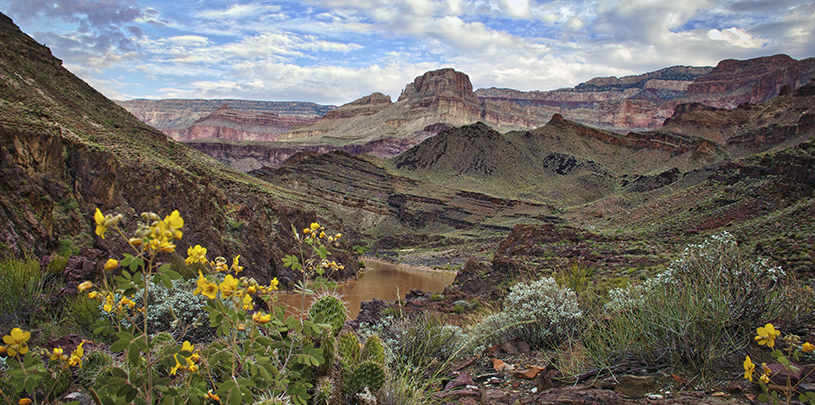
 by Amanda Podmore, Grand Canyon Director
by Amanda Podmore, Grand Canyon Director
Have you ever tried to get a job with the National Park Service, U.S. Forest Service, or other public land management agency? Scoring a job with the federal government is notoriously difficult. There are a lot of hoops to jump through.
Job applicants must navigate a cumbersome online process at USAjobs.gov. Just figuring out if you’re eligible is a struggle. Then, you must rank a multitude of skills on a scale of one to five and sprinkle the right keywords into your resume and supporting materials, hoping that you pass the initial automated sorting of applicants.
But for Native people, applying for federal jobs can be particularly complicated by factors like limited internet. Those who live in remote parts of tribal lands may lack physical addresses, which are required to apply. Plus, the current hiring process tends to overlook lived experience and traditional knowledge that Native applicants bring.
At Grand Canyon National Park, which is carved out of ancestral lands of at least 11 tribes and adjacent to the Navajo Nation and the Havasupai and Hualapai tribes, Native people make up only around six percent of park employees, according to one park service estimate. But the superintendent at Grand Canyon National Park is working to change that by reforming the park’s hiring process and expanding employment opportunities for people from Grand Canyon associated tribes.
As a federal agency, Grand Canyon National Park is bound by a set of rules for how it hires employees. Up until 2021, it could only favor local candidates if they lived within 30 miles of the park, a radius that excludes neighboring tribal communities.
Thanks to efforts by superintendent Ed Keable, a new hiring authority was approved for Grand Canyon National Park that allows it to directly hire qualified candidates from six Native American tribes (Havasupai, Hualapai, Hopi, San Juan Southern Paiute, Kaibab Band of Paiute Indians, and the Navajo Nation), with less paperwork and a streamlined process.
The park has improved its hiring process as much as it can under current laws, but there are still shortcomings to this reform.
The new hiring policy excludes five of the 11 associated tribes of the Grand Canyon (Las Vegas Band of Paiute Indians, Moapa Band of Paiute Indians, Paiute Indian Tribe of Utah, Pueblo of Zuni, and the Yavapai-Apache Nation). It only applies to technical, clerical, and maintenance jobs, which have lower salary caps and are often seasonal. Anyone receiving a job under this policy would not qualify for park housing, which means the employee would be required to commute sometimes hundreds of miles for the job.
The Grand Canyon Trust is working to advance additional hiring reform that will allow the park to more easily hire qualified individuals from all 11 Grand Canyon associated tribes for jobs at all levels of park management. This will likely require federal legislation, but reform of this nature could be replicated across the country.
This reform won’t be perfect, but it’s a starting point. The park and gateway communities will need to address housing and transportation gaps to remove additional barriers to employment. But addressing these needs will have the additional benefit of creating employment opportunities outside of the park.
Grand Canyon National Park is a physical and spiritual home to Indigenous peoples to this day. Few realize that the Havasupai lived in Grand Canyon National Park until 1928, when the federal government pushed them off their ancestral lands.
Native voices, like the Intertribal Centennial Conversations Group, have come forward and identified employment as a key reform needed for the park’s second century. Through increased representation at all levels of park management, the original stewards of the land can direct how the Grand Canyon is cared for, for generations to come.
It is our hope that Grand Canyon National Park can serve as a model for hiring reform that is then scaled across federally managed lands on the Colorado Plateau. Nationwide, only 2.5 percent of the park service workforce is Native American, and Native women, in particular, are underrepresented. We are overdue for management changes that create welcoming and inclusive spaces for Indigenous voices, beliefs, and priorities.
Ultimately, hiring reform that increases the representation of the 11 Grand Canyon associated tribes in park staff and fosters a safer place for Native employees is a crucial step in centering Indigenous cultures, histories, and perspectives in park management.
80% of Arizona voters support Baaj Nwaavjo I'tah Kukveni National Monument, according to a new poll.
Read MoreThe Colorado River below Glen Canyon Dam is heating up. Find out why.
Read MoreGroundwater pumping at a uranium mine near the Grand Canyon will affect the canyon's springs, scientists says.
Read More